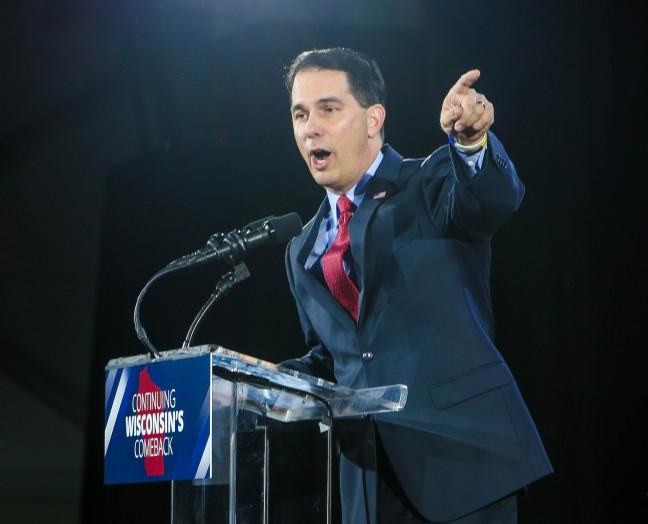I may have voted for Gov. Scott Walker once upon a time — I’ve since earnestly and repeatedly repented for the sins of my 20-year-old self — but since he actually took office I’ve found very few of his actions even remotely palatable. Usually, when I hear that Walker has issued a statement, I cringe a bit and place a small bet on what small remnant of decency he seeks to cast from our state next. Therefore, his recent words on so-called “right-to-work” legislation are, comparatively, refreshing to us trudging along in Fitzwalkerstan, a term coined by U.S. Sen. Mark Pocan, D-Madison.
In comments to reporters last week, Walker said, “As I said before the election and have said repeatedly over the last few years, I just think right-to-work legislation right now, as well as reopening Act 10 to make any other adjustments, would be a distraction from the work that we’re trying to do.”
Right-to-work legislation basically means that an employer cannot require union membership as a condition of employment. In the wake of 2011’s landmark Act 10, employee rights are at a low point in modern Wisconsin history. Public employee unions are still struggling to survive, and once again public employees are dealing with stagnant wages and slashed benefits.
Walker’s opinion conflicts with comments from Senate Majority Leader Scott Fitzgerald, R-Juneau, and Rep. Chris Kapenga, R-Delafield, vowing to bring right-to-work legislation to a debate early in the next session. Fitzgerald and Kapenga, are not really interested in Wisconsin’s economic health as much as they are interested in kicking a dead horse hoping it will rise so they can kill it again.
In 2013, union membership was down to 6.7 percent of private sector workers in Wisconsin. This is an exceedingly small target compared to things like $2.2 billion budget deficits and growing revenue shortfalls. Of course, this also ignores the fact that the effects of right-to-work legislation have never been proven to have any actual effect on economic growth. Even Walker, normally as straight-laced of a Republican as you can find, is reluctant to attribute economic growth in other states to right-to-work legislation when other factors can explain their comparative success.
Here’s a pro-tip to the Republican Legislature: Elections do have consequences and you have enacted, arguably, the strongest anti-worker reforms in the country the past few years; however, there is a point of diminishing returns and this legislation would pass that line. It doesn’t affect many employees, and some employees it would affect are currently Republican donors. Would you want to risk that steady flow of sweet, sweet political cash and bring forth another set of critical eyes on Wisconsin in exchange for unproven legislation that not even your own governor has interest in?
I won’t pretend to know Republican legislative strategy, but I do know that this is not a very efficient use of their time. The Legislature is in session only a short period of time each year and I imagine there are many other heinous proposals they’d rather pass than yet another nail in the unionized coffin.
I don’t expect or even ask Walker to veto the legislation when it crosses his desk like Senate Minority Leader Jennifer Schilling, D-La Crosse, does because I know he won’t. He can play both sides in this situation; he allows legislative Republicans take all the public heat for the proposal and then “reluctantly” sign it when it crosses his desk before touting its virtues on the campaign trail later next year.
For us Democrats, right-to-work is one right we’d rather not have. While it seems inevitable, and unstoppable, the fight is worth it. As distant as it may seem, we will live in a post-Fitzwalkerstan state, and when that day comes, it will be because we are not kicking groups while they are down or focusing on money for companies over money for workers. The Republican agenda’s current success will be its ultimate downfall, and we need to keep fighting to be there when it happens.
Adam Johnson ([email protected]) is a Master’s candidate at the La Follette School of Public Affairs.














